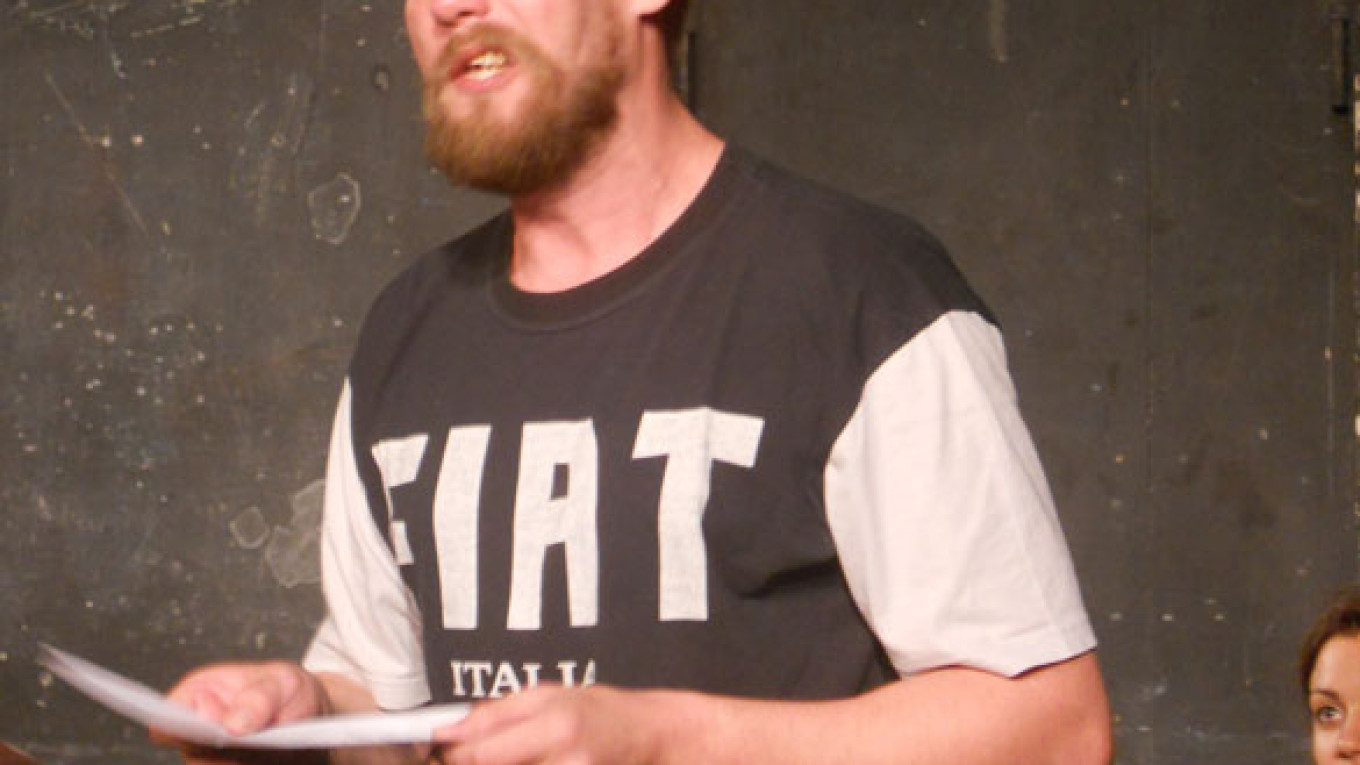It has now become a tradition that Moscow’s theater season begins with a daunting dose of new drama. This year, according to Yelena Kovalskaya, the art director of the Lyubimovka playwriting festival who spoke briefly at the festival opening on Saturday, there will be some 40 plays read and performed over a nine-day period. For those whose math is as bad as mine, I’ve used my computer’s calculator to determine that that comes out to 4.44 plays per day.
That is a lot of plays.
And there are a lot of playwrights and directors who have come in from around the world to see what Kovalskaya and her team are up to. Mike Packer and Noah Birksted-Breen are coming in from England, David M. White and Erik Ramsey from the United States. Each will present his own work even as they observe presentations of new works by both famous and unknown Russian writers.
Packer’s “tHe dYsFUnCKshOnalZ,” a piece about a punk band originally staged at the Bush Theatre in London, will be read in Russian translation on Monday at 5 p.m. at Teatr.doc, the seat of most of the Lyubimovka events.
Birksted-Breen, White and Ramsey will participate in a panel discussion Wednesday about new play development in the West at the Institute of Media, Architecture and Design, otherwise known as Strelka, at 14 Bersenevskaya Naberezhnaya. The starting time for that discussion is noon, and it is expected to run about two hours.
All of this adds a distinct international flavor to the current festival and implies that the event is growing and maturing. Nevertheless, Lyubimovka’s reason for being is the open forum that it gives to Russian writers and the field of Russian drama.
This year, the schedule includes new plays by a large number of major Russian playwrights. Mikhail Durnenkov and Pavel Pryazhko presented new works on Sunday. Yaroslava Pulinovich, a hot young writer from Yekaterinburg, will see her new play “Disappeared Without a Trace” read on Tuesday at 3 p.m. Other important writers making appearances are Vadim Levanov (“Gerontophobia” on Wednesday at 5 p.m.), Maksym Kurochkin (“The Schooling of Bento Bonchev” on Wednesday at 9 p.m.), and Yury Klavdiyev (“Ruins” on the festival’s final day, Sunday, Sept. 12, at 3 p.m.).
Yelena Gremina’s “One Hour Eighteen,” a bold documentary drama about the case of attorney Sergei Magnitsky who authorities allowed to die in prison before he came to trial on what many feel were trumped-up corruption charges, was a featured performance Saturday evening.
But the heart of Lyubimovka every year is the discovery of unknown talents and the development of new projects involving important artists from other fields who are taking their first steps in the genre of theater.
Lyubimovka kicked things off Saturday with a reading of “Squatters,” a new work created mostly by filmmakers. This is a piece that takes a look back at the perestroika-era phenomenon of artists taking up illegal residence in abandoned buildings around Moscow. Research and technical work on the text was done by Ivan Lebedev, a film editor; Vsevolod Lisovsky, a documentary filmmaker; and Ilya Ovchinnikov, a journalist. The play itself was written by the popular screenwriter Nana Grinshtein. Her credits include scripts for the films “Piter FM” and “Plus One.”
“Squatters” consisted of dialogues and monologues involving several painters who lived in a sort of commune in an abandoned building on Bolshaya Polyanka in the years 1989 to 1993. But it was the participation of poet Andrei Rodionov, who interrupted the flow of dialogue to recite many of his poems written on themes paralleling those of the artists, that gave a sense of real life to this enterprise.
Rodionov is a powerful and convincing reader of his own work. If you have never seen him perform you can watch a video of him reciting one of his poems, or see a video of him backed by the musical group Okraina.
In fact, many of the spectators, who were invited by moderator Gremina to take part in a free discussion of the play afterwards, stated that while they found the play lacking in any number of areas, Rodionov’s poetry was the work’s saving grace.But, as was pointed out by Gremina ― one of the founders of Teatr.doc, which is the perennial host of Lyubimovka ― the whole point of the festival is to take chances. To present works that are still in development, that may still be half-baked and far from ready. To encourage people with all kinds of backgrounds, aesthetics and opinions to participate and make their voices heard.
This is a recipe that has helped numerous unknown writers take the leap from obscurity to prominence. It is also the recipe that has maintained a forum for free and open Russian voices to be heard by anyone who makes the effort to listen. That in itself makes Lyubimovka one of the most important and influential events on Russia’s annual cultural calendar.
A Message from The Moscow Times:
Dear readers,
We are facing unprecedented challenges. Russia's Prosecutor General's Office has designated The Moscow Times as an "undesirable" organization, criminalizing our work and putting our staff at risk of prosecution. This follows our earlier unjust labeling as a "foreign agent."
These actions are direct attempts to silence independent journalism in Russia. The authorities claim our work "discredits the decisions of the Russian leadership." We see things differently: we strive to provide accurate, unbiased reporting on Russia.
We, the journalists of The Moscow Times, refuse to be silenced. But to continue our work, we need your help.
Your support, no matter how small, makes a world of difference. If you can, please support us monthly starting from just $2. It's quick to set up, and every contribution makes a significant impact.
By supporting The Moscow Times, you're defending open, independent journalism in the face of repression. Thank you for standing with us.
Remind me later.


